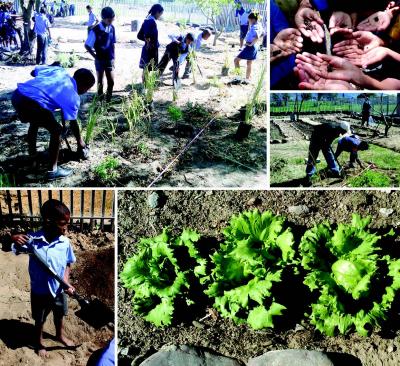In Africa, A Garden of Plenty
 South Africa is a land of extremes, and nowhere is that as evident as in the diverse towns that fall to the northeast of Cape Town.
South Africa is a land of extremes, and nowhere is that as evident as in the diverse towns that fall to the northeast of Cape Town.
Here, some of the world’s most fertile land and prestigious vineyards give way to squatter camps, muddled scrap wood, tent and tin cities that are the unfortunate legacy of the nation’s apartheid era.
For the past two years, a team of Lehigh faculty, students and alumni have worked tirelessly in Paarl, a Western Cape city of nearly 200,000, to help the students and families of Amstelhof Primary School.
Located less than 300 feet from the nearest squatter camp, Amstelhof is a public school whose student population is 100 percent “coloured”—a mixed lineage of people who are racially and culturally distinct from the country’s emergent white and black majorities.
It’s a native-born population facing incredibly long odds. Under-nourished and living on a bare minimum diet, families often send their children to school because they are guaranteed a breakfast, snack and lunch, often a porridge. But that’s changing at Amstelhof.
“Hunger is one of the biggest obstacles in education,” says Diane Boyle, a graduate of the Comparative and International program and part of Lehigh’s South African Education Development Initiative team.
“Curriculum is important, but when the need is so overwhelming, you need to establish basic priorities. Food security is that priority.”
Lehigh is tackling that problem in partnership with School’s Environmental Education and Development, or SEED, a nonprofit agency that runs an organic classroom program. Working hand in hand with the Amstelhof community, SEED has worked to build a school garden of fruits, vegetables and herbs that will help to feed the school’s 500 students.
The effort is part of Lehigh’s ambitious South African Education Development Initiative, which is focused on supporting special education, community development, leadership, and math and science education at Amstelhof.
“In their lives, the children don’t have much. They come from humble origins,” says Alex Wiseman, associate professor of comparative and international education. “But they do take ownership of this garden, and that means the world to them.”